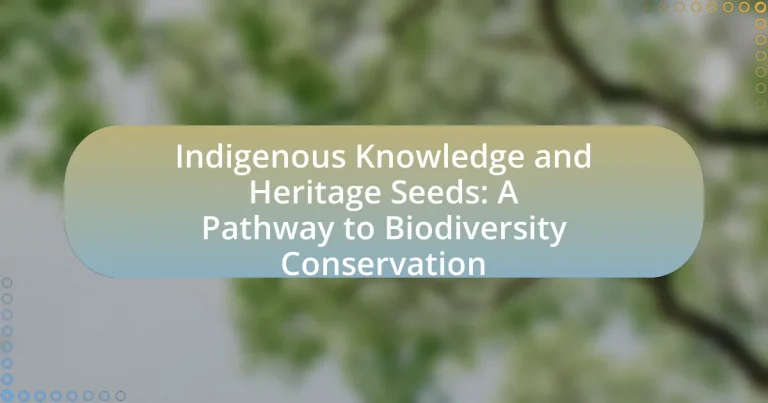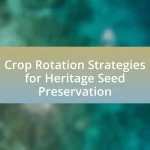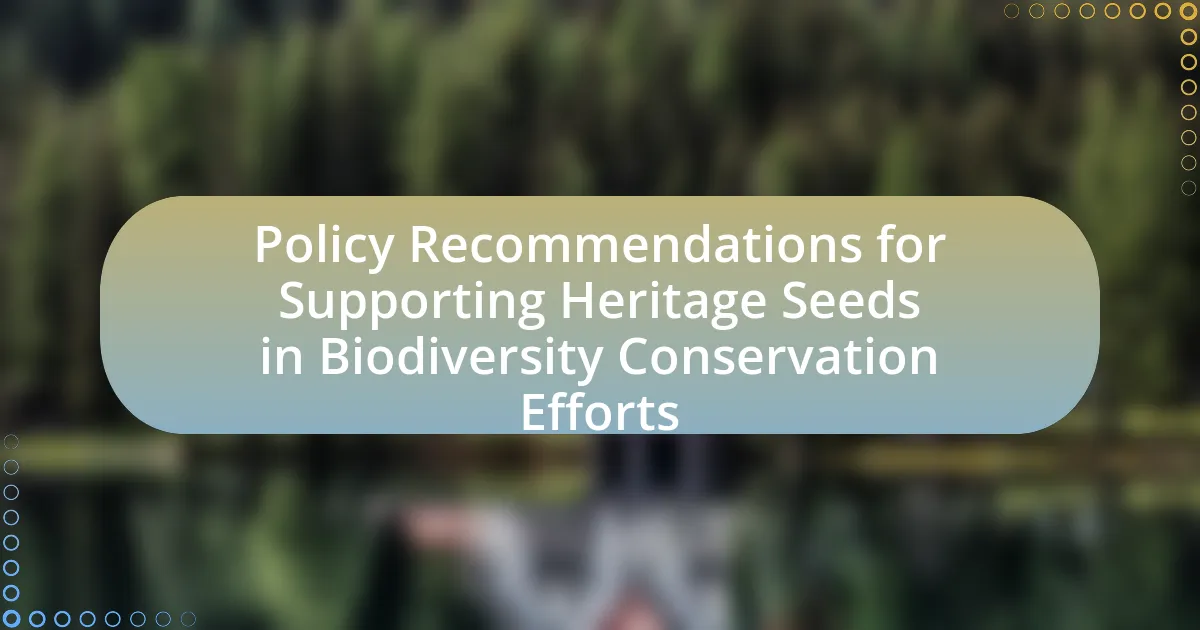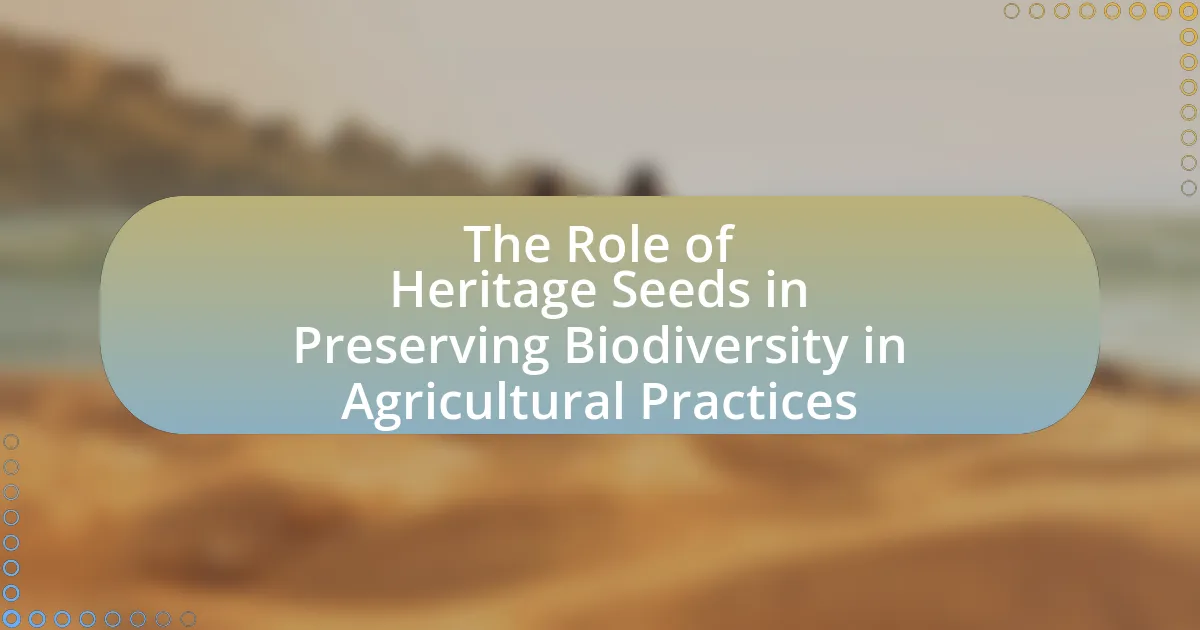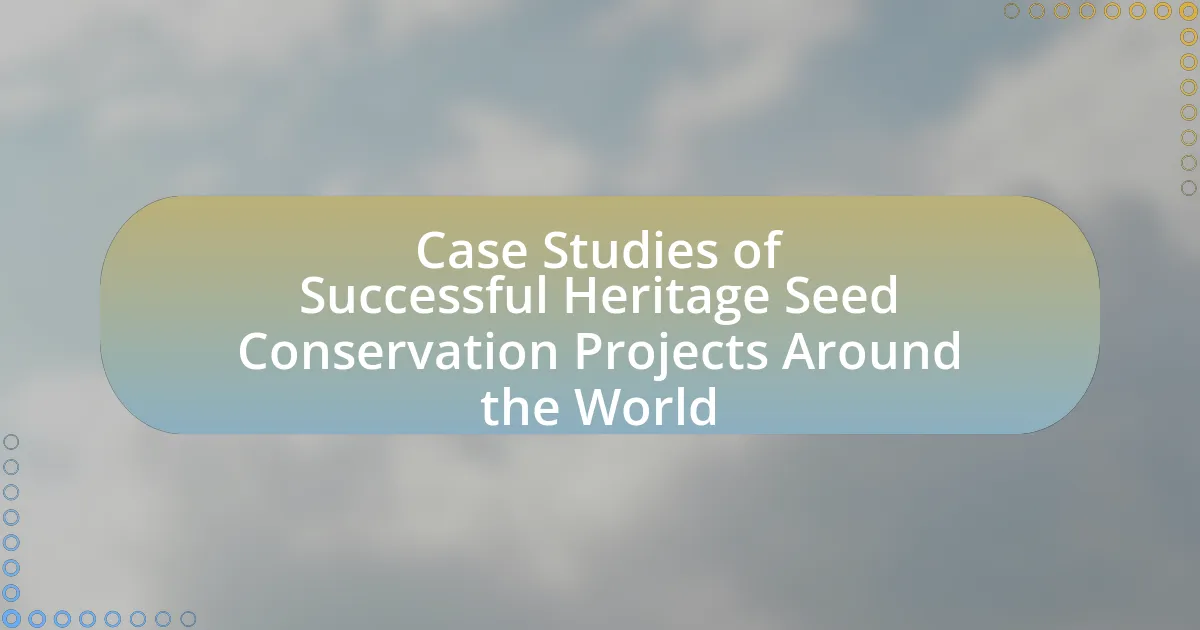Indigenous Knowledge and Heritage Seeds are essential components in the conservation of biodiversity, representing traditional practices and seed varieties cultivated by Indigenous peoples over generations. This article explores how Indigenous Knowledge contributes to sustainable agricultural practices, enhances soil health, and preserves genetic diversity, which are vital for food security and ecosystem resilience. It also examines the challenges faced by Indigenous Knowledge and Heritage Seeds, including climate change and globalization, and highlights strategies for their protection and integration into modern conservation efforts. Additionally, the article discusses the role of community engagement, educational programs, and policy advocacy in supporting the preservation of Indigenous practices and the promotion of Heritage Seeds.
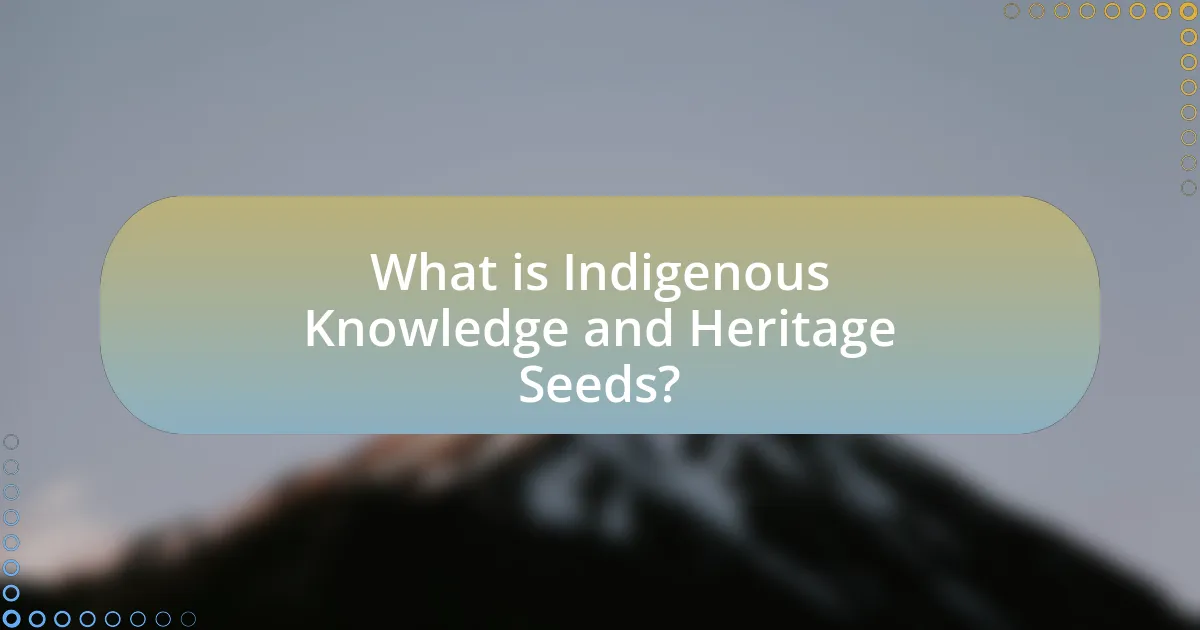
What is Indigenous Knowledge and Heritage Seeds?
Indigenous Knowledge refers to the traditional understanding and practices developed by Indigenous peoples over generations, encompassing their relationship with the environment, culture, and biodiversity. Heritage Seeds are traditional seed varieties that have been cultivated and passed down through generations, often adapted to local conditions and resistant to pests and diseases. Together, Indigenous Knowledge and Heritage Seeds play a crucial role in biodiversity conservation by promoting sustainable agricultural practices and preserving genetic diversity, which is essential for food security and ecosystem resilience. Studies show that Indigenous agricultural practices contribute significantly to maintaining biodiversity, as they often involve crop rotation, intercropping, and the use of organic fertilizers, which enhance soil health and ecosystem stability.
How do Indigenous Knowledge and Heritage Seeds contribute to biodiversity conservation?
Indigenous Knowledge and Heritage Seeds significantly contribute to biodiversity conservation by promoting the cultivation and preservation of diverse plant varieties adapted to local ecosystems. This traditional knowledge encompasses sustainable agricultural practices, which enhance soil health and resilience against climate change, thereby maintaining genetic diversity. For instance, Indigenous farmers often select and propagate seeds that are best suited for their specific environments, leading to a rich variety of crops that can withstand pests and diseases. Research indicates that Indigenous agricultural systems can support up to 80% of the world’s biodiversity in agricultural landscapes, highlighting their crucial role in conserving genetic resources.
What are the key principles of Indigenous Knowledge related to agriculture?
The key principles of Indigenous Knowledge related to agriculture include sustainability, biodiversity, community involvement, and holistic management. Sustainability emphasizes the long-term health of ecosystems, ensuring that agricultural practices do not deplete resources. Biodiversity is crucial as Indigenous practices often promote the cultivation of a wide variety of crops, which enhances resilience against pests and climate change. Community involvement reflects the collective knowledge and practices passed down through generations, fostering a sense of stewardship and responsibility towards the land. Holistic management integrates ecological, social, and economic factors, recognizing the interconnectedness of all elements in agricultural systems. These principles are validated by numerous studies highlighting the effectiveness of Indigenous agricultural practices in maintaining ecological balance and promoting food security.
How do Heritage Seeds differ from commercial seeds?
Heritage seeds differ from commercial seeds primarily in their genetic diversity and cultivation practices. Heritage seeds are open-pollinated varieties that have been passed down through generations, often adapted to local climates and conditions, which enhances biodiversity. In contrast, commercial seeds are typically hybrid varieties developed for uniformity, higher yields, and resistance to pests, often requiring specific agricultural inputs. This distinction is significant as heritage seeds contribute to sustainable agriculture and food security by preserving genetic diversity, while commercial seeds can lead to dependency on chemical inputs and reduced biodiversity.
Why is the preservation of Indigenous Knowledge important?
The preservation of Indigenous Knowledge is important because it plays a crucial role in biodiversity conservation and sustainable resource management. Indigenous Knowledge encompasses traditional practices, ecological insights, and cultural values that have been developed over generations, enabling communities to manage their environments effectively. For instance, Indigenous agricultural practices often promote crop diversity and resilience, which are essential for adapting to climate change. Research indicates that Indigenous farming techniques can enhance soil health and increase yields, contributing to food security. Furthermore, the loss of Indigenous Knowledge can lead to the erosion of cultural identity and the disappearance of unique ecological practices that support biodiversity. Therefore, safeguarding this knowledge is vital for both environmental sustainability and cultural heritage.
What role does Indigenous Knowledge play in sustainable farming practices?
Indigenous Knowledge plays a crucial role in sustainable farming practices by providing traditional ecological insights that enhance biodiversity and soil health. This knowledge encompasses centuries of experience in crop selection, pest management, and land stewardship, which are tailored to local ecosystems. For instance, Indigenous farmers often utilize polyculture systems, which promote diverse plant species that can improve resilience against pests and diseases, thereby reducing the need for chemical inputs. Research indicates that Indigenous agricultural practices, such as the use of heritage seeds, contribute to the conservation of genetic diversity, which is essential for adapting to climate change. Studies have shown that regions where Indigenous farming methods are practiced exhibit higher levels of biodiversity compared to conventional farming areas, underscoring the effectiveness of these traditional approaches in promoting sustainable agriculture.
How does Indigenous Knowledge enhance local ecosystems?
Indigenous Knowledge enhances local ecosystems by integrating traditional ecological practices that promote biodiversity and sustainability. This knowledge includes understanding local flora and fauna, seasonal cycles, and land management techniques that have been refined over generations. For instance, Indigenous agricultural practices often involve polyculture and crop rotation, which improve soil health and reduce pest outbreaks, thereby fostering a more resilient ecosystem. Research indicates that areas managed by Indigenous peoples often exhibit higher biodiversity levels compared to those under conventional agricultural practices, as seen in studies conducted by the United Nations Environment Programme, which highlight the effectiveness of Indigenous stewardship in maintaining ecological balance.
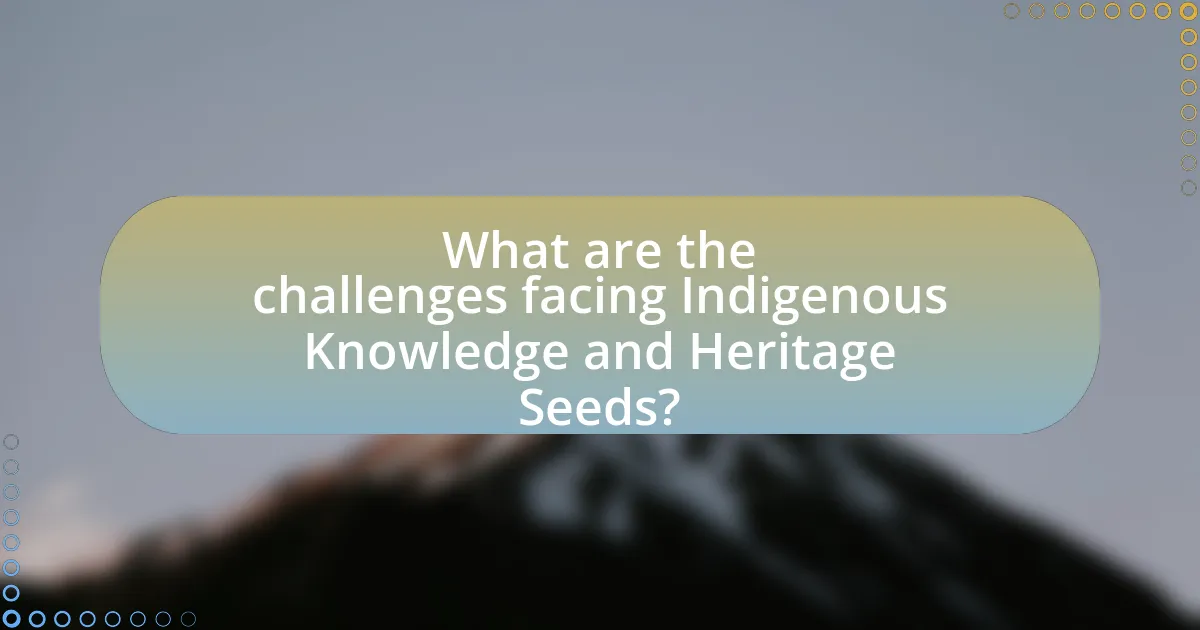
What are the challenges facing Indigenous Knowledge and Heritage Seeds?
The challenges facing Indigenous Knowledge and Heritage Seeds include loss of biodiversity, climate change, and the erosion of traditional practices. Loss of biodiversity occurs as modern agricultural practices favor monocultures, which diminishes the variety of seeds traditionally used by Indigenous communities. Climate change impacts the growing conditions for these seeds, making it difficult for Indigenous farmers to cultivate them effectively. Additionally, the erosion of traditional practices is exacerbated by globalization and industrial agriculture, which often overlook the value of Indigenous knowledge systems. These factors collectively threaten the sustainability and preservation of Indigenous Knowledge and Heritage Seeds.
How do modern agricultural practices threaten Indigenous Knowledge?
Modern agricultural practices threaten Indigenous Knowledge by prioritizing industrial methods over traditional farming techniques, which undermines the cultural and ecological wisdom embedded in Indigenous practices. The introduction of monocultures and genetically modified organisms (GMOs) disrupts the biodiversity that Indigenous farmers have cultivated for generations, leading to a loss of traditional seed varieties and associated knowledge. For instance, a study published in the journal “Agriculture and Human Values” highlights that the erosion of local seed diversity directly correlates with the decline of Indigenous agricultural practices and knowledge systems. This shift not only diminishes food sovereignty but also marginalizes Indigenous communities, as their unique agricultural insights are increasingly overlooked in favor of standardized, profit-driven approaches.
What impact does climate change have on Heritage Seeds?
Climate change negatively impacts heritage seeds by altering their growing conditions, which can lead to reduced yields and loss of genetic diversity. As temperatures rise and precipitation patterns shift, many heritage seed varieties may struggle to adapt, resulting in decreased resilience against pests and diseases. Research indicates that traditional varieties, which are often more sensitive to environmental changes, face increased risk of extinction, threatening agricultural biodiversity and food security. For instance, a study published in “Agricultural Systems” highlights that climate change could reduce the viability of specific heritage crops by up to 50% in certain regions by 2050, underscoring the urgent need for conservation efforts.
How does globalization affect the preservation of Indigenous Knowledge?
Globalization negatively impacts the preservation of Indigenous Knowledge by facilitating the commodification and appropriation of cultural practices and traditional knowledge systems. As global markets expand, Indigenous communities often face pressure to commercialize their knowledge, leading to a dilution of cultural significance and authenticity. For instance, the World Intellectual Property Organization has documented cases where Indigenous knowledge is patented by corporations without consent, undermining the rights of Indigenous peoples and eroding their cultural heritage. Furthermore, the influx of globalized media and technology can overshadow local traditions, making it challenging for Indigenous practices to thrive in their original contexts.
What strategies can be employed to protect Indigenous Knowledge and Heritage Seeds?
Strategies to protect Indigenous Knowledge and Heritage Seeds include legal frameworks, community engagement, and documentation practices. Legal frameworks, such as the Nagoya Protocol, establish guidelines for the fair and equitable sharing of benefits arising from genetic resources, thereby safeguarding Indigenous rights. Community engagement fosters the active participation of Indigenous peoples in decision-making processes, ensuring their knowledge and practices are respected and preserved. Documentation practices, including the creation of databases and archives, help to record and maintain Indigenous agricultural practices and seed varieties, which are crucial for biodiversity conservation. These strategies collectively contribute to the protection and sustainability of Indigenous Knowledge and Heritage Seeds.
How can community engagement support the conservation of Heritage Seeds?
Community engagement can significantly support the conservation of Heritage Seeds by fostering local stewardship and knowledge sharing. When communities actively participate in the preservation of these seeds, they contribute to the maintenance of genetic diversity and traditional agricultural practices. For instance, initiatives like seed banks and community gardens encourage the cultivation and exchange of Heritage Seeds, ensuring their survival and adaptation to local environments. Research indicates that community-led conservation efforts can enhance biodiversity, as seen in projects across various regions where local farmers have successfully revived and maintained traditional seed varieties, thus reinforcing the importance of cultural heritage in agriculture.
What role do educational programs play in promoting Indigenous Knowledge?
Educational programs play a crucial role in promoting Indigenous Knowledge by facilitating the transmission of traditional practices, values, and ecological understanding from one generation to the next. These programs often incorporate local Indigenous perspectives, ensuring that cultural heritage and biodiversity conservation methods are recognized and respected. For instance, research conducted by the United Nations Educational, Scientific and Cultural Organization (UNESCO) highlights that educational initiatives that include Indigenous Knowledge contribute to sustainable development and environmental stewardship, as they empower Indigenous communities to manage their natural resources effectively. By integrating Indigenous Knowledge into curricula, educational programs not only validate these perspectives but also enhance biodiversity conservation efforts through informed practices rooted in centuries of experience.
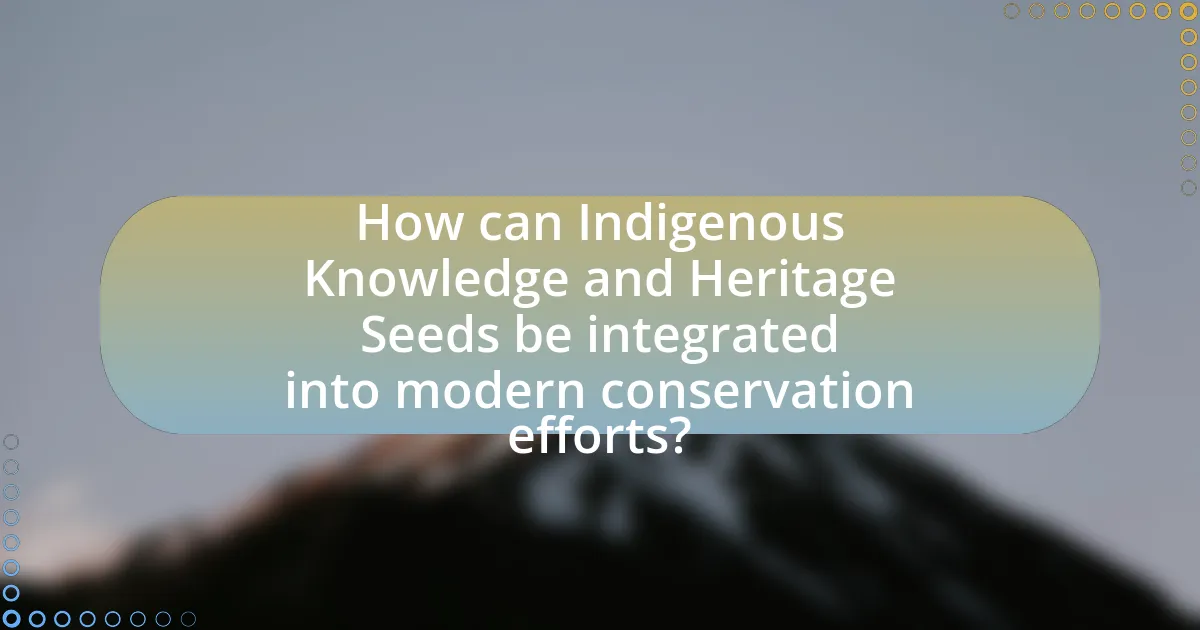
How can Indigenous Knowledge and Heritage Seeds be integrated into modern conservation efforts?
Indigenous Knowledge and Heritage Seeds can be integrated into modern conservation efforts by recognizing and utilizing traditional ecological practices and crop varieties that have been developed over generations. This integration can enhance biodiversity, as Indigenous communities possess a deep understanding of local ecosystems and sustainable agricultural practices that promote resilience. For instance, studies have shown that Indigenous agricultural systems often maintain higher levels of genetic diversity in crops, which is crucial for adapting to climate change and pest pressures. By collaborating with Indigenous communities, conservation programs can incorporate these heritage seeds into restoration projects, thereby preserving both cultural heritage and ecological integrity.
What are the benefits of combining Indigenous practices with scientific approaches?
Combining Indigenous practices with scientific approaches enhances biodiversity conservation by integrating traditional ecological knowledge with modern scientific methods. Indigenous practices often include sustainable land management techniques developed over generations, which can improve ecosystem resilience. For instance, Indigenous fire management practices have been shown to reduce wildfire risks and promote biodiversity, as evidenced by studies in Australia where traditional burning techniques have led to healthier ecosystems. Additionally, the incorporation of Indigenous knowledge can lead to more culturally relevant conservation strategies, fostering community engagement and stewardship, which is crucial for the long-term success of conservation efforts.
How can policymakers support the integration of Indigenous Knowledge in conservation strategies?
Policymakers can support the integration of Indigenous Knowledge in conservation strategies by actively collaborating with Indigenous communities to co-develop policies that recognize and incorporate traditional ecological practices. This collaboration can be facilitated through formal partnerships, ensuring that Indigenous voices are included in decision-making processes, which has been shown to enhance biodiversity outcomes. For instance, research indicates that areas managed by Indigenous peoples often exhibit higher biodiversity levels compared to those under conventional management, highlighting the effectiveness of Indigenous practices in conservation. By providing funding and resources for Indigenous-led conservation initiatives, policymakers can further empower these communities to implement their knowledge effectively, thereby fostering sustainable environmental stewardship.
What successful case studies exist that demonstrate this integration?
Successful case studies demonstrating the integration of Indigenous knowledge and heritage seeds in biodiversity conservation include the work of the Indigenous Seed Keepers Network in the United States, which focuses on preserving traditional seed varieties and agricultural practices. This initiative has successfully revitalized local food systems and enhanced biodiversity by promoting the cultivation of heirloom seeds that are well-adapted to local environments. Additionally, the “Seeds of Survival” program by the Canadian non-profit organization, USC Canada, has effectively combined Indigenous agricultural practices with modern conservation techniques, resulting in increased crop diversity and resilience among Indigenous communities. These case studies illustrate the effectiveness of integrating Indigenous knowledge with heritage seed conservation efforts, leading to sustainable agricultural practices and enhanced biodiversity.
What practical steps can individuals take to support Indigenous Knowledge and Heritage Seeds?
Individuals can support Indigenous Knowledge and Heritage Seeds by actively participating in seed saving and sharing initiatives. Engaging in local seed banks or community gardens that focus on preserving Indigenous varieties helps maintain biodiversity and cultural heritage. Additionally, individuals can educate themselves and others about the importance of Indigenous agricultural practices, which often promote sustainable farming methods. Supporting Indigenous farmers through purchasing their seeds and products directly contributes to the economic viability of these communities. Research indicates that Indigenous agricultural practices, such as polyculture and traditional ecological knowledge, enhance ecosystem resilience, making these efforts crucial for biodiversity conservation.
How can consumers make informed choices regarding Heritage Seeds?
Consumers can make informed choices regarding Heritage Seeds by researching their origins, understanding their benefits, and seeking reputable sources. Heritage Seeds, which are traditional varieties that have been passed down through generations, often possess unique flavors and resilience to local pests and diseases. By consulting resources such as seed catalogs, agricultural extension services, and local farmers, consumers can gain insights into the specific characteristics and growing conditions of these seeds. Additionally, organizations like Seed Savers Exchange provide valuable information on the preservation and cultivation of Heritage Seeds, ensuring that consumers can select varieties that align with their gardening goals and ecological practices.
What actions can be taken to advocate for Indigenous rights and knowledge preservation?
To advocate for Indigenous rights and knowledge preservation, individuals and organizations can engage in policy advocacy, support Indigenous-led initiatives, and promote education about Indigenous cultures. Policy advocacy involves lobbying for laws that protect Indigenous land rights and cultural heritage, such as the United Nations Declaration on the Rights of Indigenous Peoples, which emphasizes the importance of respecting Indigenous knowledge systems. Supporting Indigenous-led initiatives, such as community seed banks, helps preserve traditional agricultural practices and biodiversity. Additionally, promoting education about Indigenous cultures in schools and communities fosters respect and understanding, which is essential for the preservation of Indigenous knowledge.
